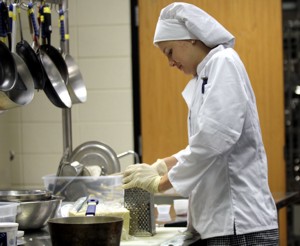Walking into the Culinary Arts classroom, one sees many desks, a white board and a silver counter top with a sink. Walking further back into the classroom, the kitchen area comes into view. With 22 stoves and multiple, large refrigerators it is hard to believe that this kitchen isn’t found in a commercial restaurant. The kitchen is the main classroom for the many students in the Culinary Arts Science, Technology, and Industry (STI) program here at North Point.
The program teaches sophomores, juniors and seniors the essentials of working in the kitchen and much more. The students learn the basics, such as safety, and specialized information for specific areas in the culinary field. Each year the students learn more knowledge of the kitchen and working in it.
Sophomore year, students learn the basics of safety and sanitation. Their junior year they refine their basics and are introduced to various techniques for cooking. Senior year students start specializing in specific fields. “It’s a lot of hands on,” said Mrs. Jones, one of the Culinary instructors.
The program doesn’t have a lot of book work. Grading is focused on the students’ work in the kitchen, which is focused on recipes. The grades are determined through the student dishes’ taste, texture, and appearance, as well as if the students followed the recipe and the proper techniques of preparation. “We check to see if they scaled up or down the recipe to feed more or less people,” added Ms. Dodson, the other Culinary teacher.
Students may be given recipes or may have to provide their own. They get them online or in textbooks that their teachers provide. “We sometimes make recipes,” said Taylor Nappi (’13).
The students enjoy the program. They say the hardest part is time management. “You want to make your dish a representation of you, so you don’t want to make your dish look rushed,” commented Jhullian Garcia (’12).
The program teaches students how to prepare dishes from pastries to steaks. “Basically anything you can get in a restaurant we make,” said Christian Walker (’13). The knowledge of the wide variety of foods lets students find what aspect of the culinary field they enjoy the most. The experience helps them to decide what field they want to specialize in after they graduate.
The program offers a lot of opportunities to students to get experience in the culinary field before they graduate. The students cater various events such as teacher lunches, county events, principal lunches, the “Taste of America” event at the Capitol Building in Washington, and the annual Martin Luther King, Jr. Prayer Breakfast.
The students have many post-high school opportunities available to them through the program. If they maintain a B average, they can get three credits for Johnson & Wales University or earn six months time for field study for the Culinary Institute of America.



